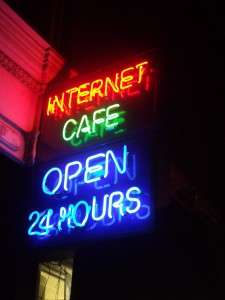What Internet Cafes Tell Us About Online Poker
 Recent online gambling legislative success in New Jersey, following on the heels of Nevada and Delaware, has left online poker players giddy about the prospects of regulation coming to other states soon. Bills are pending in California, Illinois and Massachusetts; Pennsylvania is said to be ready to introduce one soon. The dominoes seem poised to fall.
Recent online gambling legislative success in New Jersey, following on the heels of Nevada and Delaware, has left online poker players giddy about the prospects of regulation coming to other states soon. Bills are pending in California, Illinois and Massachusetts; Pennsylvania is said to be ready to introduce one soon. The dominoes seem poised to fall.
Public opinion, however – and more importantly legislative opinion – is not squarely on the side of gamblers. To understand that, look no further than the ongoing flap over internet cafes.
An internet café ostensibly is a small business that allows the public to access the internet in exchange for a fee. The café also makes money by serving customers food and drink. It’s a business model that’s existed at least since the 1990s, when internet access started to become widespread.
Where things get hairy is a tweak that first appeared in the Southern U.S., where some cafes started offering chances to win prizes to customers for purchasing internet access. Patrons play video-slot like games on the computers inside the café to find out if they’ve won a prize. The business model is effectively a sweepstakes dressed up with computers, and boy has it ruffled feathers.
Alabama has ruled that the model violates state gambling laws, prompting the industry to re-tool as bingo games. Virginia has outlawed the businesses by statute. Ohio has been pondering a crackdown on the cafes as part of a total overhaul in its approach to gambling. North Carolina politicians have returned $10,000 in campaign contributions tied to internet café operators, and media reports suggest that upwards of $250,000 more may follow.
Then there’s Florida, where the state’s lieutenant governor resigned earlier this month after being connected to internet cafes run by a veterans group called Allied Veterans of the World. Allied raked in almost $300 million from the operation of internet cafes that was supposed to be used for charitable purposes. Somehow only $6 million of that money made it to charities.
Florida is now considering a law effectively designed to ban the cafes. It was overwhelmingly passed by the Florida House of Representatives last week.
Yes, the South has a long history of social conservatism. And yes, there’s a colorable argument to be made that the cafes flirt with (if not go right over) the edge of being unregulated gambling. Given those facts, it’s not surprising that there’s a push in these states to prohibit these businesses.
Yet those same arguments apply to poker. How many times have people argued that the skill element of poker excepts it from gambling? How many times have opponents argued that it is? Both sides have arguments that pass the laugh test on that one.
The flap over the cafes highlights a broad swath of public and legislative opinion that still runs against expanding gambling in any form, live or online, internet café or online poker. Arguments that prohibition doesn’t work (as demonstrated by the success of the cafes in the South, a region of the country with broad anti-gambling laws) and that regulation and taxation are the way to go hold no sway in these areas.
States like Alabama, Virginia and North Carolina were never great contenders for online poker legislation. Their value is tempering the optimism that one success in a place like New Jersey can generate for online poker’s prospects in the U.S.
It’s a big country out there.




















COMMENTS